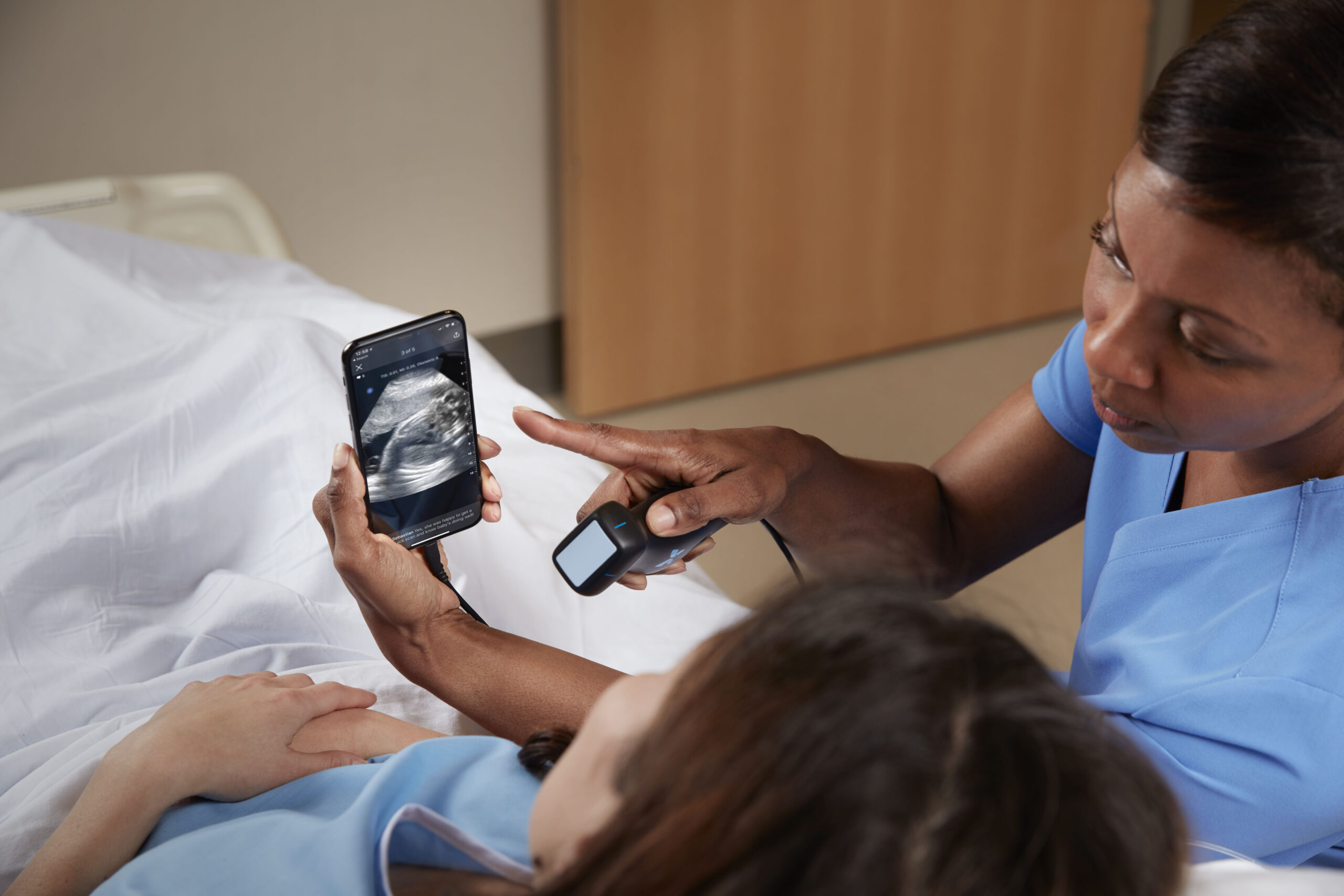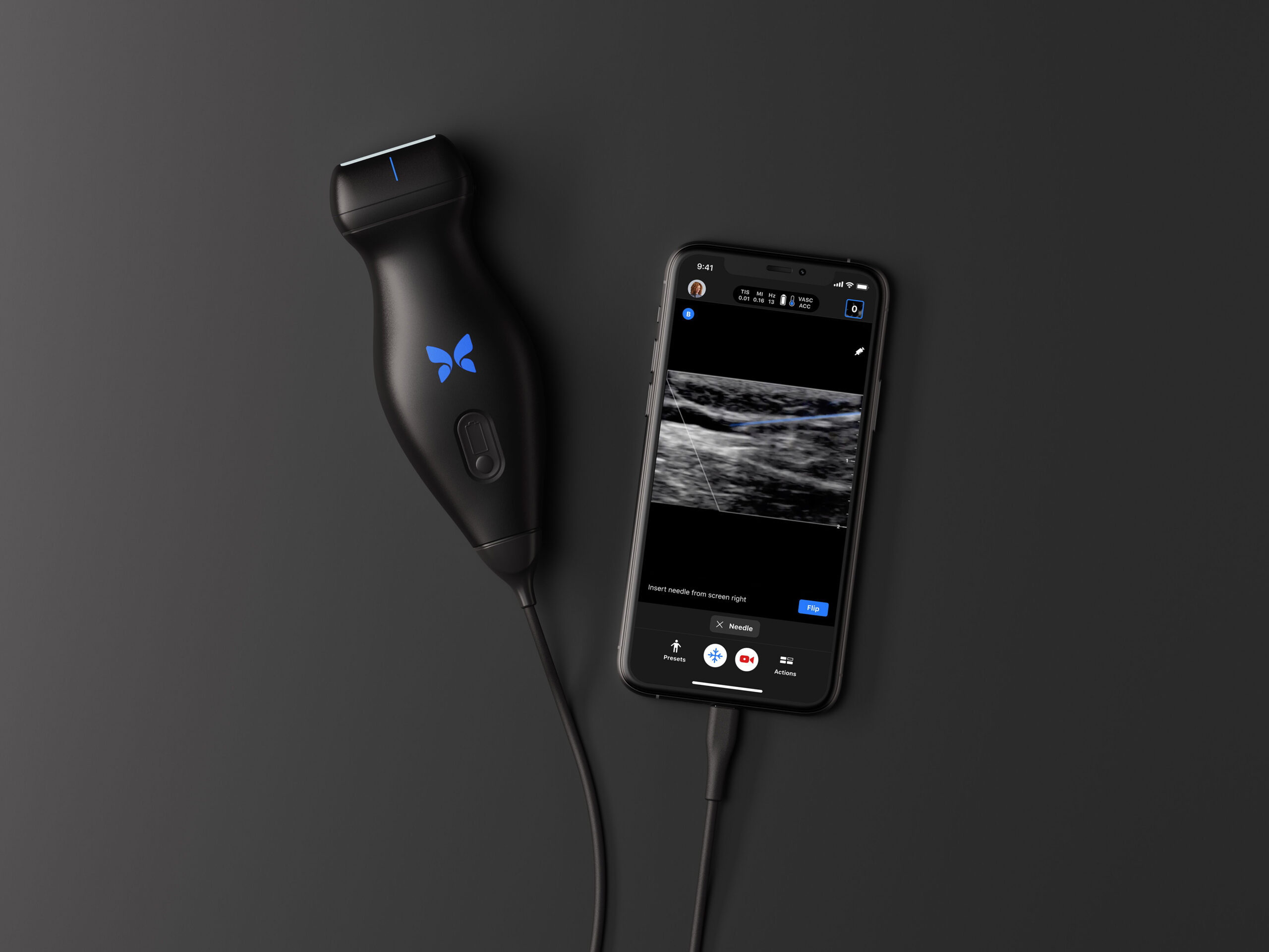
Butterfly iQ with a patient.
A study published in New England Journal of Medicine in late March found that when coupled with AI, Butterfly Network’s hand held ultrasound device – Butterfly iQ – can help midwives determine fetal gestational age as accurately as a trained sonographer.
This is one data point but it indicates the overall potential for AI to transform healthcare, in this case by democratizing access to ultrasound in under resourced areas.
The study recruited 4,695 pregnant volunteers from two sites each in Zambia and North Carolina between September 2018 to June of last year. Funding for the study came from the Bill and Melinda Gates Foundation. The National Institute of Health and University of North Carolina School of Medicine contributed resources to the study. Ultrasound probes for the study’s research were provided by the Butterfly Network. The funders of the study did not participate in data collection, analysis, study design, interpretation of results, nor preparation of the manuscript.
Low resource areas typically do not have access to expensive and bulky ultrasound equipment nor to trained sonographers to interpret the ultrasound. This is problematic because assessing fetal age via ultrasound is a key component of providing quality prenatal care. So authors created and trained a “neural network to estimate gestational age from the sweeps and, in three test data sets, assessed the performance of the artificial intelligence (AI) model and biometry against previously established gestational age.”
Data gathered from the study demonstrated that after analyzing ultrasound sweeps – some of which were conducted with Butterfly iQ — AI could determine gestational age with accuracy comparable to a trained sonographer using standard biometry. This level of accuracy between AI and the trained sonographer remained even when using a low-cost portable ultrasound device: Guilford, Connecticut-based Butterfly network’s device, Butterfly iQ.

Butterfly iQ
“Armed with a pocket-sized Butterfly probe and a smartphone, a Zambian midwife with no prior training in sonography can assess gestational age as accurately as a certified sonographer using an expensive machine,” said Joni Price, an OBGYN professor at UNC who led the study and lives full time in Zambia, in a news release. “This has the potential to revolutionize the delivery of obstetric care in settings like Zambia.”
In such settings, it can be difficult to have access to expensive ultrasound equipment, not to mention someone trained in interpreting the data, the study noted. For example, pregnant women in sub-Saharan Africa often do not have their initial ultrasound until 23 weeks into their pregnancy, though in the United States women receive the first ultrasound at 8 weeks, the report noted.
As a result, Butterfly iQ offers a potential avenue to address this gap in care and a feasible avenue to attempt to democratize obstetric ultrasounds, according to the report.
“Prior to this important research, access to low-cost imaging devices and the expertise to perform scans presented challenging hurdles to overcome in low-resource care settings. The results of this study offer hope to millions of mothers when it comes to determining risk and sequencing care,” said John Martin, chief medical officer at Butterfly Network in a news release. “The findings also reinforce our belief that mid-level practitioners, when armed with the right tools, can meaningfully improve outcomes and advance the standard of care.”
With the efficacy of the hand held ultrasound device coupled with AI, pregnant women could benefit in general.
“Ultrasound is like a stethoscope to the modern obstetrician. We use it all day, every day. These results foretell a future where all pregnant people – not just those who live in rich countries – can access the diagnostic benefits of obstetric ultrasound, ” said Jeff Stringer, associate director of UNC’s Institute for Global Health and Infectious Diseases and the one credited with the project idea, in a news release.
Photo credit: Butterfly Network














